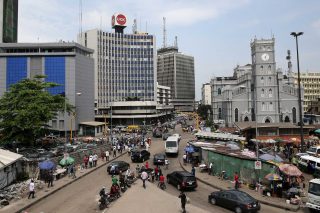The extensive population of small businesses in Nigeria have raised the critical issue of funding, which has consistently inhibited their growth. These businesses make up a large part of the private sector that the Nigerian economy firmly relies on. As such, the inability for these businesses to get access to cheap capital in order to innovate and scale have made it difficult for the country to fend for its citizens. In an attempt to solve some of these problems, the government launched the Development Bank of Nigeria (DBN) to provide business and agriculture investment in the country.
On Thursday, April 20, 2018, in a move that endorses the new initiative, the European Investment Bank (EIB) and the African Development Bank (AfDB) announced a joint investment in the newly created development bank; $20 million equity stake by the EIB with an added $50 million equity investment from the AfDB. These investments, which have been finalized already, seeks to help the DBN address the financing challenges of the private sector.
“Private sector businesses are critical to the development of the Nigerian economy as they possess huge potential for employment generation and output diversification. Nevertheless, there has been an under-performance of these businesses and this has undermined their contribution to economic growth. Among the issues affecting their performance, the shortage of finance, particularly investment finance, occupies a very central position. The Development Bank of Nigeria is expected to contribute to mobilizing significant long-term financing to an important yet underserved sector with high development potential,” said Stefan Nalletamby, Director of the Financial Sector Development Department at the African Development Bank.
The Nigerian government has often spoken about the vital role the private sector plays as to the growth of the economy, and the need to prioritize their development. But oftentimes, these words haven’t been backed with strategic actions to sort out the prevalent problems. The micro-, small- and medium-scale enterprises (MSMEs) have been left to deal with high-interest rates for loans obtained from commercial banks which, consequently, limit their capacity to take risks with new innovations.
DBN was created to target these class of entrepreneurs. It was initiated by the Federal Government of Nigeria to address financing challenges hindering private sector investment in the country. Its main aim as stated on its website is “to alleviate financing constraints faced by MSMEs and small Corporates in Nigeria through the provision of financing and partial credit guarantees to eligible financial intermediaries on a market-conforming and fully financially sustainable basis.”
Investments from Africa’s biggest development bank and a bank owned by the Member States of the European Union, with added support from the World Bank and French Agency for Development, gives major credence to the aspirations of this newly minted bank.
The EIB, known for its long-term financing solutions, invests based on the policy goals of the European Union. The Vice-President of the bank, Ambroise Fayolle, expressed a sense of optimism while speaking about the partnership with Nigeria, and said the desirable outcome would be a blossoming Nigerian private sector. “New private sector investment is crucial to create jobs and enable businesses to expand, and limited access to long-term financing holds back economic growth,” he said.
“The European Investment Bank is pleased to support the new Development Bank of Nigeria to strengthen private-sector investment in Africa’s largest economy. We look forward to continued close cooperation with Nigerian and international partners to ensure that once fully operational the new Development Bank of Nigeria can help harness the country’s economic potential.”
Nigeria does have the potential, with a large number of entrepreneurial youths making up its population. According to the DBN, there are over 37 million MSMEs, but less than five percent of these businesses have access to credit in the financial system. The EIB and the AfDB also know quite well that the entrepreneurial climate in the country will give maximum return on their investments.
In a bid to also support the startup ecosystem, the Vice President Yemi Osinbajo, took a tour of tech companies earlier this week, and some days before then, he took a trip to Aba, the commercial capital of indigenous entrepreneurs in the eastern part of Nigeria to reaffirm the government’s commitment to support local innovation and the growth of small and medium businesses.
When these government commitments and foreign investments are eventually backed up with the right policies and infrastructure projects, these small businesses – and the entire private sector – have the ability to lift the whole country out of the current economic woes.








